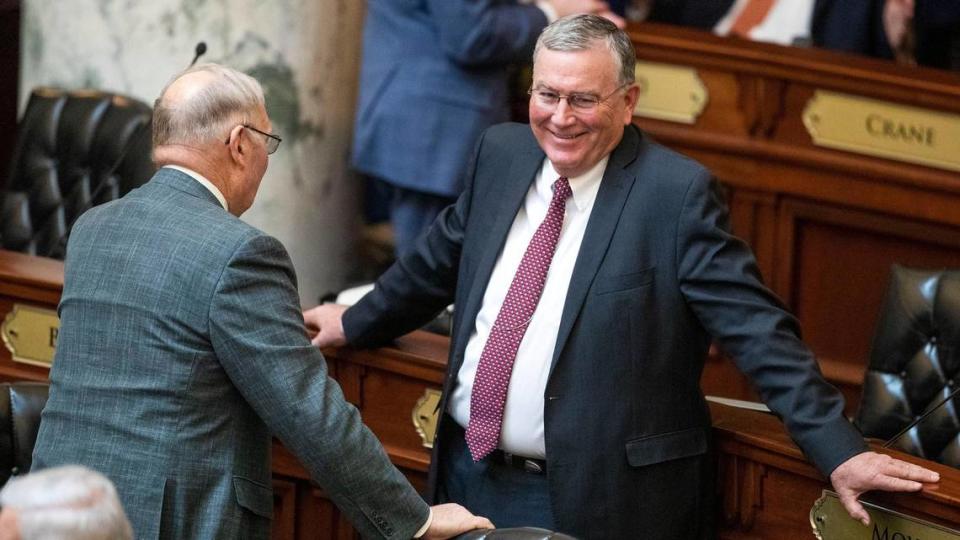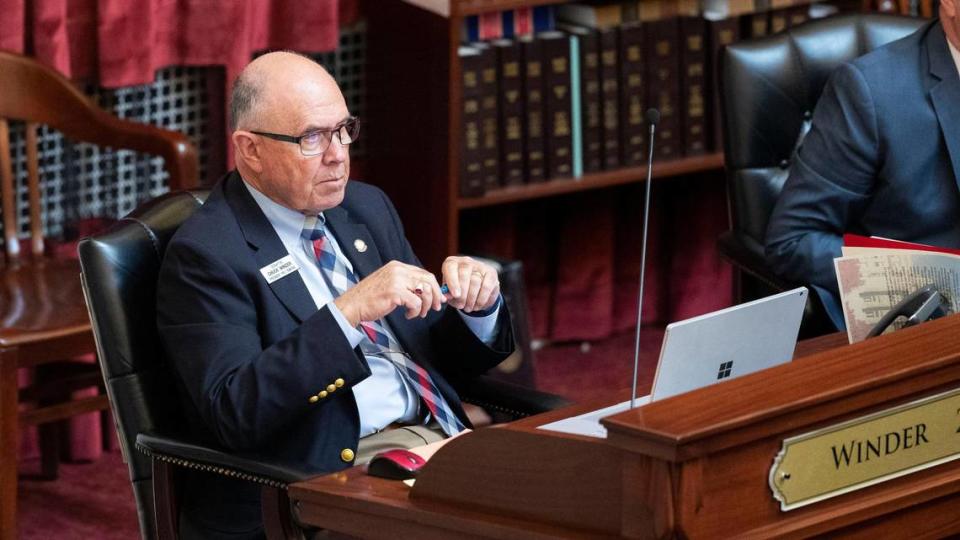Idaho House votes to adjourn, waits on Senate; Little signs, criticizes property tax bill
The Idaho House of Representatives voted Wednesday afternoon to temporarily adjourn the legislative session, returning later in the year to address redistricting.
The House voted 55-8-6 to adopt House Concurrent Resolution 23, a Ways and Means Committee resolution introduced last week that would allow the Legislature to recess until Sept. 1 at the latest. The speaker of the House and president of the Senate would be able to call the lawmakers back into session at any point prior to Sept. 1.
The resolution was then introduced in the Senate and sent to the Senate State Affairs Committee. The Senate has recessed for the second time Wednesday evening — until 8 p.m. — without voting on the resolution.
Lawmakers have said they need to return to business later in the year to handle the effects of redistricting. Idaho code requires the secretary of state to convene the redistricting committee by June 1 of the year following U.S. Census completion. However, results from the 2020 Census have been delayed, with Census Bureau officials saying they won’t have data completed until August at the earliest. The redistricting committee has 90 days to come up with new districts.
Idaho lawmakers have said they might need to change candidate filing deadlines depending on when the new districts are announced. With the census data delay, it’s possible those deadline changes could be addressed in January 2022, at the start of next year’s regular session.
The Legislature also could potentially call itself back into session this year to deal with funds from the American Rescue Plan Act.
Gov. Little signs Idaho property tax bill called ‘grossly irresponsible’ by critics
Idaho Gov. Brad Little signed the final bill on his desk — one increasing the state’s homeowner’s exemption for property taxes, among other things — into law, while echoing some of the concerns raised by opponents of the legislation.
In a transmittal letter published Wednesday, Little said he had “significant concerns” about House Bill 389, which increased the homeowner’s exemption from $100,000 to $125,000. The legislation also includes a cap on budget increases tied to new construction and annexation. It increases the amount available for what’s known as the “circuit breaker” program, but the legislation also restricted which Idahoans qualify for that program.
In his letter, Little said he supports the increase in property tax relief and the boost to the circuit breaker program, which offers tax credits for seniors, people with disabilities and widowers. The bill raised that credit to $1,500 from $1,380, but added a requirement that the property in question not have an assessed value of more than 125% of the median value of homes in the county. Critics said that change could disqualify many Idahoans who could benefit from the program.
Little also critiqued the complexity of the bill, saying it wasn’t in line with his vision for a fair and simple tax code.
“I am signing House Bill 389 because it provides some relief to Idaho taxpayers,” he wrote. “However, I fear the long-term consequences may outweigh this temporary reprieve. I believe we can do more to address this growing problem, and I believe we can do so in a way that is not only more transparent, but also more closely aligns with my goal of fair, simple, competitive and predictable taxes.”
Last week, the Legislature’s Democratic Caucus called the bill “grossly irresponsible,” saying it failed to address the booming housing market in Idaho and did not match the market growth since Republican legislators capped the exemption at $100,000 in 2016.
“In the last 12 months, home prices in Ada County have grown by 27% and in Canyon County by 42%,” Assistant House Democratic Leader Lauren Necochea said in a news release. “This bill does not even cushion homeowners from one year of skyrocketing home prices, let alone the five years of price growth that occurred since the exemption was capped.”
House speaker asks committee to review, revise Respectful Workplace Policy
House Speaker Scott Bedke, R-Oakley, has asked the House Ethics and House Policy Committee to review and revise the Respectful Workplace Policy adopted in 2018. The move comes two weeks after an Idaho legislator resigned following an accusation of sexual assault and a House ethics panel’s recommendation to expel him.
Bedke said the improved policy, which he expects to be in place by next January, will apply to anyone at the Capitol, including House members, legislative staffers, volunteers and the media.











